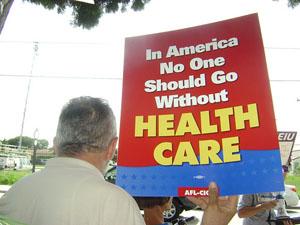Rhetoric heats up health care debate
(Image: Flickr user leoncillo sabino (cc: by-nc-sa))
Radio host Rush Limbaugh fears the proposal would lead to nationalized health care.
"Washington, government, state and local will be able to regulate every facet of our behavior under the guise that it has some kind of cost impact on health care," Limbaugh said on one of his programs.
Limbaugh has his followers. Sen. John Barrasso (R-WY) shares Limbaugh’s concerns and started using new media to get his message out. He co-hosts a new online show with Sen. Tom Coburn (R-OK). They answer questions from Facebook, Twitter and YouTube.
Though Barrasso’s audience may not be as big as Limbaugh’s, his criticisms fall in line, "Folks that look at these numbers say it will force people who have insurance now to be moved off of that insurance to lose the insurance they have now. So that doesn’t do it," Barrasso said.
On the show his statements go unchallenged but are they correct? Alwyn Cassil of the Center for Studying Health System Change analzyes the politics and policy on both sides of the aisle.
"I think there is rhetoric going on right now that is designed to scare the public into supporting what it is they are proposing," Cassil said.
Barrasso worked 24 years as an orthopedic surgeon in Casper. He served as President of the Wyoming Medical Society and his medical background puts him in a unique position in this debate. He argued the Democratic reform proposals will only cover about one third of the uninsured.
In Wyoming, 15 percent of the state’s population lacks coverage. Barrasso said creating a government insurance plan to compete with private ones won’t bring down costs: "A government plan though isn’t competition. A government is never a competitor, it is a predator."
Barrasso repeatedly said a Washington take over would ration care and give bureaucrats the power to delay and deny medical care. A Pulitzer Prize-winning fact checking project called Politifact examined his claim and found the bill does not mention rationing or limiting treatment.
"This bill doesn’t set limits on how much care you can get nor does it require as some of the opponents have suggested any sort of mandatory counseling to recommend euthanasia there have been a lot of distortions about what really is in the bill," Politifact spokesperson Bill Adair said.
Cassil says statements like Barrasso’s have become a distraction, "It is a sound bite it is not getting to the underlying issues. Look we ration care every day. We have finite resources we need to find out how we can buy the most health we can buy with the dollars that we have."
Barrasso’s main role has been that of a critic. Even though he is a doctor he does not serve on either of the two Senate committees crafting the bill. The proposal passed the Health, Education and Labor Committee without GOP support. Negotiations have been ongoing when Congress is in session. Republicans are united in their opposition and Democrats are fighting off attacks as well as disagreement within their own ranks.
Senate Majority Leader Harry Reid is optimistic but skepticism is growing among those watching, "We stand closer today to health insurance reform than we ever have in the last 50 years. And that’s where we’re heading home with our heads held high, because we did some good work here."
When lawmakers return from August break they’ll have to figure out how to pay for the bill.
Republican Mike Enzi also wants to see more changes, "It needs to have the support of about 80 people. That will show it covers the loopholes and that it will work if it winds getting only 60 votes it will be the most liberal bill this country has ever seen and it may do things we won’t be able to correct."
Enzi has called on Congress to pass a bill that gives tax credits to people who purchase plans. Barrasso wants language to reduce junk lawsuits, something he believes drives up costs. Both Senators will hear a lot more from their constituents as they travel around the state over the next few weeks. It is likely these meetings will only reinforce the opposition to a bill that is expected to hit the Senate floor in September.
Barrasso hopes the bill will reduce junk lawsuits, something he said drives up costs. He called on Congress to pass a bill that gives tax credits to those who buy insurance.
Report filed by Sara Sciammacco of "Capitol News Connection" for Wyoming Public Radio.
Created by Bureau Chief and Executive Producer Melinda Wittstock, Capitol News Connection from PRI provides insightful, localized coverage of participating stations’ congressional delegations.
